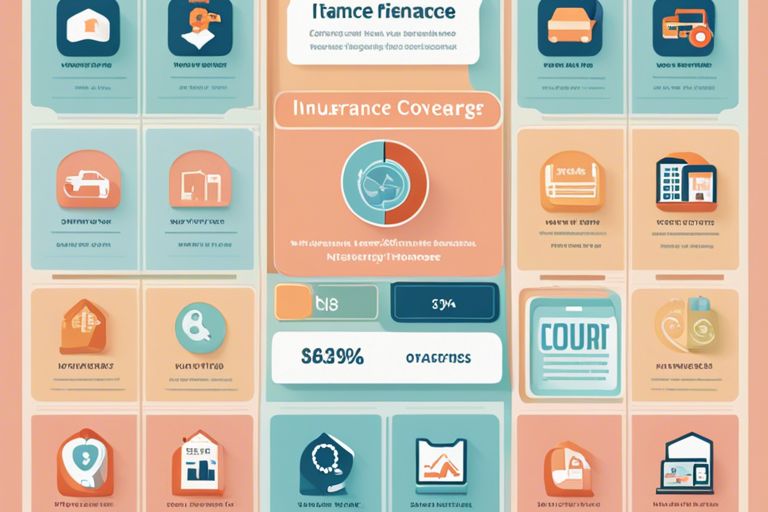Many individuals often find insurance to be a complex and daunting topic to navigate. In this informative blog post, we will probe into the world of insurance, breaking down the different types of coverage options available to help you better understand and choose the most suitable insurance plan for your needs. From health and life insurance to auto and home insurance, we will explore the nuances of each type of coverage and highlight the key factors to consider when selecting the best policy for you.

Life Insurance Options
Term Life Insurance
For those looking for affordable coverage for a specific period, term life insurance is a popular choice. It provides a death benefit to beneficiaries if the policyholder passes away within the specified term.
Whole Life Insurance
For individuals seeking permanent coverage with a cash value component, whole life insurance offers lifelong protection. Premiums generally remain stable throughout the policyholder’s life, providing financial security for loved ones.
Options: Whole life insurance policies offer various options, such as the ability to take out loans against the cash value, potential for dividends, and the opportunity to customize coverage to fit individual needs.
Universal Life Insurance
One flexible option for life insurance is universal life insurance. It combines the protection of term life with a savings component that can accumulate cash value over time.
The flexibility of universal life insurance allows policyholders to adjust premiums and coverage amounts based on their changing needs, making it a versatile choice for long-term financial planning.

Health Insurance Choices
There’s a wide range of health insurance options to choose from, depending on your needs and circumstances. Understanding the differences between individual, group, and short-term health insurance can help you make an informed decision when selecting coverage.
Individual Health Insurance
Insurance companies offer individual health insurance plans that provide coverage for one person or a family. This type of insurance can be tailored to fit specific needs and budget constraints, offering a personalized approach to healthcare coverage.
Group Health Insurance
An employer typically sponsors group health insurance for its employees, providing coverage for a group of people under one policy. This type of insurance often offers comprehensive benefits and lower premiums compared to individual plans.
Group health insurance is a valuable option for many individuals as it spreads risk among the group, resulting in more cost-effective coverage. Employers may also contribute to the premiums, making it an attractive choice for employees.
Short-Term Health Insurance
One option for individuals in need of temporary coverage is short-term health insurance. These plans typically provide coverage for a limited period, offering benefits for unexpected medical expenses during transitional periods, such as between jobs or waiting for other coverage to begin.
Health insurance is crucial for protecting yourself and your family from the financial burden of medical expenses. Understanding the different options available can help you select a policy that meets your needs and provides adequate coverage.

Property Insurance Protection
Homeowners Insurance
Many homeowners invest in Homeowners Insurance to protect their property against unforeseen events like fire, theft, or natural disasters. This type of insurance not only covers the physical structure of the house but also personal belongings inside.
Renters Insurance
An Insurance policy designed for renters, Renters Insurance offers coverage for personal belongings in case of theft or damage. It also provides liability protection in case someone is injured while on the rental property.
A Renters Insurance policy is important for anyone renting a property, as it can provide peace of mind and financial protection in case of unexpected events.
Flood Insurance
Renters living in flood-prone areas should consider getting Flood Insurance to protect their belongings from water damage. Standard renters insurance policies typically do not cover flood damage, making this additional coverage crucial in at-risk locations.
Insurance against floods can be a lifesaver in situations where water damage can result in costly losses. It is especially important for renters to safeguard their possessions with this type of coverage in flood-prone areas.
Additional Coverage Options
Disability Insurance
One imperative additional coverage option to consider is Disability Insurance. This type of insurance provides financial protection in case you become disabled and are unable to work. It ensures you continue to receive a portion of your income, easing the financial burden during a challenging time.
Long-Term Care Insurance
An often overlooked but crucial coverage option is Long-Term Care Insurance. This type of insurance covers the costs associated with long-term care services, such as nursing home care or assistance with daily living activities. It provides peace of mind knowing that you will be taken care of without depleting your savings.
Plus, Long-Term Care Insurance can help protect your assets and preserve them for your loved ones, as the cost of long-term care services can be substantial. It is especially important to consider this coverage as you plan for your retirement years.
Umbrella Insurance
Insurance experts recommend umbrella Insurance as a crucial additional coverage option. This type of policy provides extra liability coverage beyond what your standard insurance policies offer. It protects you in case you are sued for damages or injuries, providing additional financial security.
Additional, Umbrella Insurance is relatively inexpensive compared to the amount of coverage it provides. It is a valuable safety net that can protect your assets and future earnings in the event of a costly lawsuit.
Final Words
With these considerations in mind, it becomes clear that exploring different types of coverage options is crucial in securing the right insurance for your needs. Just like a well-crafted story by Malcolm Gladwell, understanding the nuances of insurance can empower you to make informed decisions and protect what matters most. So, research into the world of insurance with curiosity and vigilance, and may you find the perfect coverage to safeguard your future.
FAQ
Q: What is insurance?
A: Insurance is a form of risk management that provides financial protection against unexpected events. It involves individuals or entities paying a premium to an insurance company in exchange for coverage in case of specified events.
Q: Why do I need insurance?
A: Insurance is important because it helps protect you from financial hardship in case of unexpected events such as accidents, illnesses, or natural disasters. It provides peace of mind knowing that you have a safety net in place.
Q: What are the different types of insurance coverage options available?
A: There are various types of insurance coverage options available, including health insurance, auto insurance, life insurance, home insurance, renter’s insurance, and disability insurance, each serving different purposes and providing different forms of protection.
Q: How does health insurance work?
A: Health insurance helps cover the cost of medical expenses, including doctor visits, hospital stays, prescription medications, and preventive care. Policyholders pay a monthly premium, and in return, the insurance company helps cover a portion of the medical costs based on the policy terms.
Q: What does auto insurance cover?
A: Auto insurance provides financial protection against physical damage and bodily injury resulting from traffic collisions and liability that could arise from accidents. It typically includes coverage for medical expenses, property damage, and legal fees.
Q: What is life insurance, and why is it important?
A: Life insurance is a contract between the policyholder and the insurance company where the insurer promises to pay a designated beneficiary a sum of money in exchange for a premium upon the death of the insured. It helps provide financial security to loved ones and cover expenses like funeral costs and outstanding debts.
Q: How does home insurance protect homeowners?
A: Home insurance provides financial protection against damage to the physical structure of a house, personal belongings, and liability for accidents that occur on the property. It helps homeowners rebuild or repair their homes in case of damage due to covered events like fires, storms, or theft.
![]()






